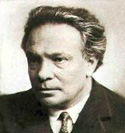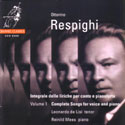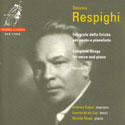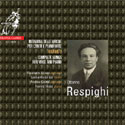| |
|
|
|
|
| |
|
|
| |
Ottorino Respighi The Complete Songs
for voice and piano
Available
at CHANNEL CLASSICS RECORDS
 Although
Ottorino Respighi (1879 - 1936) nowadays is best known
as the composer of highly coloured orchestral pieces,
as Fontane di Roma (Fountains of Rome), Pini
di Roma (Pines of Rome), and Feste romane (Roman
Festivals), he also wrote a large number of very beautiful
songs. Although
Ottorino Respighi (1879 - 1936) nowadays is best known
as the composer of highly coloured orchestral pieces,
as Fontane di Roma (Fountains of Rome), Pini
di Roma (Pines of Rome), and Feste romane (Roman
Festivals), he also wrote a large number of very beautiful
songs.
“….he who
knows Respighi’s songs can say he knows very much
of him, since they represent the word where he seeks shelter
in order to confide the secrets of his heart which he
must keep hidden in the course of everyday life, where
his soul can sing freely. An escape, one might say, that
permits him the expression of a state of mind, a feeling,
a sensation, in only a few pages of music….”
|
|
| (Elsa
Olivieri-Sangiacomo Respighi) |

|
|
| Ottorino Respighi The Complete
Songs for voice and piano |
| |
|
|
 |
CCS 9396
Ottorino Respighi
Complete Songs for voice and piano (vol. 1)
Listen to:
Acqua
from Deità Silvane (A. Rubino) (1917) |
| |
|
|
 |
CCS
11998
Ottorino Respighi
Complete Songs for voice and piano (vol.2)
Listen to:
Abbandono
(A.Vivanti) (1909) |
| |
|
|
 |
CCS
14998
Ottorino Respighi
Complete Songs for voice and piano (vol.3)
|
Available
at CHANNEL CLASSICS RECORDS
|
 |
|
|
In his songs Respighi achieved a perfect
form and an absolutely personal language. Strong melodies
are accompanied by transparent, refined piano parts and
structured in a harmonical pattern of modulations following
the changes of mood in the poetry.
In the celebrated song Nebbie, for example, he
expressed threatening loneliness in a very dramatic way
by the monotonous rhythm of accented, ‘naked’
chords.
Respighi made use of light impressionistic or dark passionate
sounds to illustrate texts by Antonio Rubino, Victor Hugo,
Sully Prudhomme, Percy B. Shelley and other poets. Drawn
to the sensual, decadent climate of the great master of
Italian ‘Decadence’ Gabriele d’Annunzio
(1863-1938), he sought to convey the subtlety and colour
of the poet's imagination in some of his most beautiful
songs
His interest in old Italian composers as Claudio Monteverdi
is to be heard in the charming Cinque Canti all’antica
for voice and piano, settings of 14th-century verses by
Giovanni Boccaccio .
Humour and a ‘popular’ sense finally inspired
Respighi occasionally to write Italian, Tuscanian, Sardian,
Armenian, French and Scottish folksongs.
|
| |
| |
| |
| back to top |
| |
|
|
|